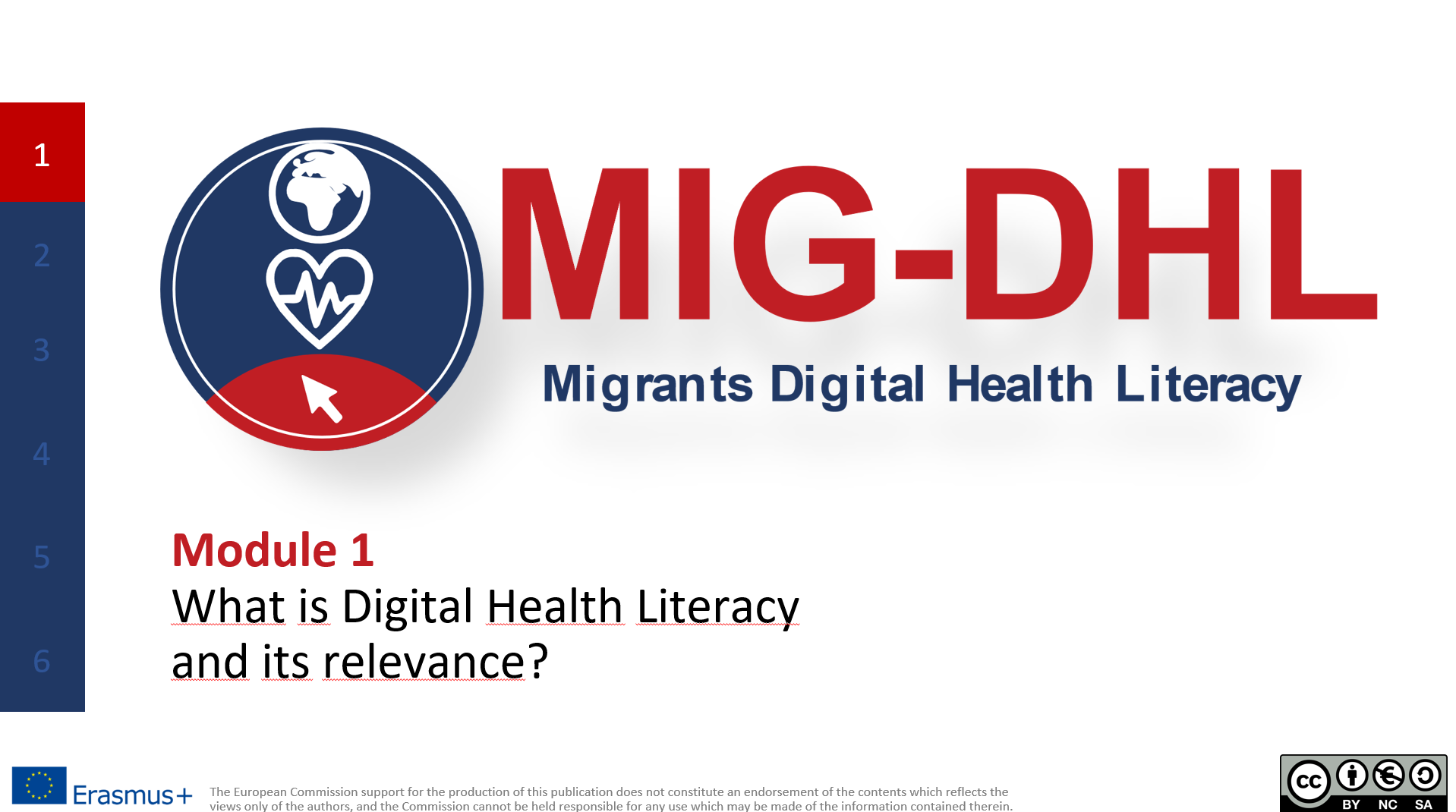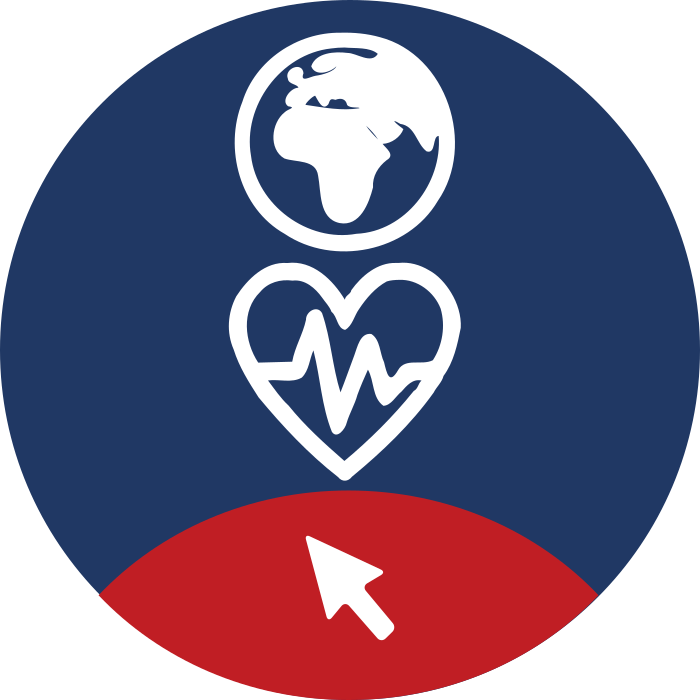Course 1 - What is Digital Health Literacy and its relevance (Course1-EN)
Training the Trainers on Module 1 - "What is Digital Health Literacy and its relevance"
Author: Carlos Serra, UVEG.
Objectives
✔ To introduce the training course contents
✔ To introduce the main concepts of Digital Health Literacy
Competences
✔ Knowledge about Digital Health Literacy (for migrants, migrant peers and health professionals)
✔ Gained awareness about Digital Health Literacy’s relevance for migrant’s health (for migrant, migrant peers and health professionals)
Materials
- Guidelines for all Designed Practical Training Activities (DPTAs) for the trainer (PDF) - For preparing the Practical Activities in a face 2 face training session.
- Handbook for the trainer (PDF) - For preparing a face 2 face training session. Explains the slides.
- Slides of Module 1 for the trainer (PDF, PPT) - To be used by a trainer in face 2 face training session.
- Online Training Module 1 for the trainee (LINK) - To be used by a trainee in the online training session.
The European Commission support for the production of this publication does not constitute an endorsement of the contents which reflects the views only of the authors, and the Commission cannot be held responsible for any use which may be made of the information contained therein. Project number: 2020-1-DE02-KA204-007679.
LessTraining the Trainers on Module 1 - "What is Digital Health Literacy and its relevance"
Author: Carlos Serra, UVEG.
Objectives
✔ To introduce the training course contents
✔ To introduce the main concepts of Digital Health Literacy
Competences
✔ Knowledge about Digital Health Literacy (for migrants, migrant peers and health professionals)
✔ Gained awareness about Digital Health Literacy’s relevance for migrant’s health (for migrant, migrant peers and health professionals)
Materials
- Guidelines for all Designed Practical Training Activities (DPTAs) for the trainer (PDF) - For preparing the Practical Activities in a face 2 face training session.
- Handbook for the trainer (PDF) - For preparing a face 2 face training session. Explains the slides.
- Slides of Module 1 for the trainer (PDF, PPT) - To be used by a trainer in face 2 face training session.
- Online Training Module 1 for the trainee (LINK) - To be used by a trainee in the online training session.
The European Commission sup
Training the Trainers on Module 1 - "What is Digital Health Literacy and its relevance"
Author: Carlos Serra, UVEG.
Objectives
✔ To introduce the training course contents
✔ To introduce the main concepts of Digital Health Literacy
Competences
✔ Knowledge about Digital Health Literacy (for migrants, migrant peers and health professionals)
✔ Gained awareness about Digital Health Literacy’s relevance for migrant’s health (for migrant, migrant peers and health professionals)
Materials
- Guidelines for all Designed Practical Training Activities (DPTAs) for the trainer (PDF) - For preparing the Practical Activities in a face 2 face training session.
- Handbook for the trainer (PDF) - For preparing a face 2 face training session. Explains the slides.
- Slides of Module 1 for the trainer (PDF, PPT) - To be used by a trainer in face 2 face training session.
- Online Training Module 1 for the trainee (LINK) - To be used by a trainee in the online training session.
The European Commission sup
Course Description

Objectives
- To introduce the training course contents
- To introduce the main concepts of Digital Health Literacy
Participants & roles
- Migrants: About 10 (newcomer) migrants in each country as beneficiaries of the training.
- Migrant peers (about 1-2): migrant peers can actively participate in the sessions outlined, as the concept of DHL is not very widespread, they can benefit from actively participating in the introductory session (irrespective of the fact that, in certain cases, they can play the role of trainers).
- Health professionals (about 1-2): The expected role of health professionals is to actively participate in the sessions (optional), based on the same argumentation as migrant peers. Health professionals may also be unfamiliar with the concept of DHL and its relevance for migrants. It is therefore advisable to invite health professionals to participate in the different sessions of this DPTA as observers and with access to the materials and online platform in case they want to observe (and even conduct) the online tasks.
Competences
- Knowledge about Digital Health Literacy (for migrants, migrant peers and health professionals)
- Gained awareness about Digital Health Literacy’s relevance for migrant’s health (for migrant, migrant peers and health professionals)
Training contents
- Introduction to the training course:
- The Erasmus+ Programme
- Overview of the project
- Overview, objectives, and schedule of the whole training course
- Concept of DHL
- DHL components: Operational skills; Navigation skills; Information searching; Evaluating reliability; Determining relevance; Adding content; protecting privacy.
- DHL self-awareness & benefits for migrants
- DHL vocabulary
Duration
Duration of the sessions: 5’30 hours.
- Face to face session: 4’30 hours (1 session of two and a half hours, one session of 2 hours)
- Online session: 1 hour.
Transversal training
- Social skills
- Language skills
- Ability of teamwork
- Skills to put in practice theoretical contents.
Methodology
- Active and participative
- Face to face training:
- Dialogue
- Role playing
- Teamwork
- Online training:
- Practical implementation -through assignments- of some tips agreed in the classroom.
Training materials
- Face to face sessions:
- PowerPoint presentations
- Word documents. Explaining the main concepts shown on PPT
- Selected videos
- Survey
- Online sessions:
- Online assignments in the training platform
- To introduce the training course contents
- To introduce the main concepts of Digital Health Literacy
- Migrants: About 10 (newcomer) migrants in each country as beneficiaries of the training.
- Migrant peers (about 1-2): migrant peers can actively participate in the sessions outlined, as the concept of DHL is not very widespread, they can benefit from actively participating in the introductory session (irrespective of the fact that, in certain cases, they can play the role of trainers).
- Health professionals (about 1-2): The expected role of health professionals is to actively participate in the sessions (optional), based on the same argumentation as migrant peers. Health professionals may also be unfamiliar with the concept of DHL and its relevance for migrants. It is therefore advisable to invite health professionals to participate in the different sessions of this DPTA as observers and with access to the materials and online platform in case they want to observe (and even conduct) the online tasks.
- Knowledge about Digital Health Literacy (for migrants, migrant peers and health professionals)
- Gained awareness about Digital Health Literacy’s relevance for migrant’s health (for migrant, migrant peers and health professionals)
- Introduction to the training course:
- The Erasmus+ Programme
- Overview of the project
- Overview, objectives, and schedule of the whole training course
- Concept of DHL
- DHL components: Operational skills; Navigation skills; Information searching; Evaluating reliability; Determining relevance; Adding content; protecting privacy.
- DHL self-awareness & benefits for migrants
- DHL vocabulary
Duration of the sessions: 5’30 hours.
- Face to face session: 4’30 hours (1 session of two and a half hours, one session of 2 hours)
- Online session: 1 hour.
- Social skills
- Language skills
- Ability of teamwork
- Skills to put in practice theoretical contents.
- Active and participative
- Face to face training:
- Dialogue
- Role playing
- Teamwork
- Online training:
- Practical implementation -through assignments- of some tips agreed in the classroom.
- Face to face sessions:
- PowerPoint presentations
- Word documents. Explaining the main concepts shown on PPT
- Selected videos
- Survey
- Online sessions:
- Online assignments in the training platform

- Type: Online session
- complementary to the face 2 face, for trainees who follow the f2f training
- for self-paced, unattended learning, for any trainee
- Duration: 2 hours

